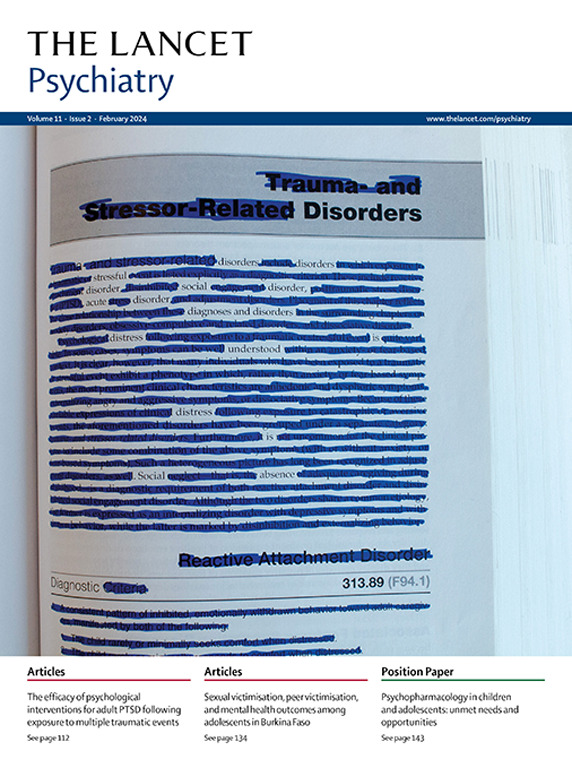严重精神疾病患者身体健康状况的遗传倾向性与合并症之间的关联:英国两项横断面观察性研究的分析
IF 30.8
1区 医学
Q1 PSYCHIATRY
引用次数: 0
摘要
背景:患有严重精神疾病的个体,包括精神分裂症和双相情感障碍,其身体健康状况的发生率较高,导致发病率和死亡率增加。虽然药物和生活方式改变等环境因素的不利影响发挥了作用,但遗传易感性对身体健康合并症的影响仍未得到充分探讨。我们调查了身体健康状况的遗传风险是否会影响严重精神疾病患者的合并症,并将这些影响与普通人群进行了比较。此外,我们还探讨了精神遗传负担与严重精神疾病患者身体健康问题发生的关系。方法我们分析了两个英国严重精神疾病患者的横断面队列——精神分裂症中的卡迪夫认知研究(CardiffCOGS)队列和国家精神卫生中心(NCMH)队列。如果个人回答了一份有效的身体健康问题自我报告问卷,并且他们的基因数据通过了质量控制,那么他们就被选中进行分析。这些个体亚群用于测试六种身体健康状况(高胆固醇、2型糖尿病、高血压、哮喘、心脏病和类风湿性关节炎)的多基因风险评分与该人群相应身体健康状况之间的关联。根据人口统计学和临床协变量(性别、年龄、吸烟和氯氮平使用)进一步调整模型。这些分析的效应大小与在一般人群中进行的研究报告的效应大小进行了比较。我们还评估了精神多基因风险评分(精神分裂症、双相情感障碍、重度抑郁症和多动症)与身体合并症之间的关系。有生活经验的人参与分析计划并指导分析结果的选择。由于缺少表型或遗传数据而被排除(CardiffCOGS中有403人;我们的分析包括来自CardiffCOGS队列的721人(平均年龄43.7岁[SD 12.1],女性267人[37.0%],男性454人[63%],自我报告为白人的703人[97.5%])和来自NCMH队列的1011人(平均年龄46.7岁[SD 13.7],女性553人[54.7%],男性458人(45.3%),自我报告为白人的928人[93.8%])。在一个或两个队列中,身体健康状况的多基因风险评分与相应的状况相关,解释了这些合并症中1.4%至6.5%的变异性。至少有一个队列的多基因风险评分效应大小与一般人群中报告的效应(在84% ci内)重叠。临床和人口因素的调整对这些关联的影响最小。精神病学多基因风险评分显示与身体合并症的关联较弱且不一致。解释:我们的研究结果支持遗传风险在严重精神疾病患者的身体健康合并症中的作用。身体健康状况的遗传倾向与合并症的关系比精神遗传倾向更强,突出了其与环境和临床因素的附加作用。这些发现表明,将遗传风险信息纳入严重精神疾病患者身体健康共病的预测算法中是有价值的,多基因风险评分应纳入开发和验证此类算法的研究中。资助欧盟“地平线2020”计划。本文章由计算机程序翻译,如有差异,请以英文原文为准。
Association between genetic liability to physical health conditions and comorbidities in individuals with severe mental illness: an analysis of two cross-sectional observational studies in the UK
Background
Individuals with severe mental illness, including schizophrenia and bipolar disorder, have elevated rates of physical health conditions, contributing to increased morbidity and mortality. While environmental factors such as adverse effects from medication and lifestyle changes play a role, the contribution of genetic liability to physical health comorbidities remains underexplored. We investigated whether genetic risk for physical health conditions influences comorbidities in people with severe mental illness and compared these effects with those in the general population. Additionally, we explored the effects of psychiatric genetic liabilities and the occurrence of physical health problems in those with severe mental illness.Methods
We analysed two UK cross-sectional cohorts of people with severe mental illness—the Cardiff Cognition in Schizophrenia study (CardiffCOGS) cohort and the National Centre for Mental Health (NCMH) cohort. Individuals were selected for analyses if they responded to a validated self-report questionnaire of physical health problems and if their genetic data passed quality control. These subsets of individuals were used to test associations between polygenic risk scores for six physical health conditions (high cholesterol, type 2 diabetes, hypertension, asthma, heart disease, and rheumatoid arthritis) and corresponding physical health conditions in this population. Models were further adjusted for demographic and clinical covariates (sex, age, smoking, and clozapine use). Effect sizes from these analyses were compared in magnitude to those reported in studies conducted in the general population. We also evaluated associations between psychiatric polygenic risk scores (schizophrenia, bipolar disorder, major depressive disorder, and ADHD) and physical comorbidities. People with lived experience were involved in the analysis planning and guided the choices of outcomes analysed.Findings
Following exclusions due to missing phenotypic or genetic data (403 individuals in CardiffCOGS; 1704 individuals in NCMH), our analyses included 721 individuals from the CardiffCOGS cohort (mean age 43·7 years [SD 12·1], 267 [37·0%] females, 454 [63·0%] males, and 703 [97·5%] with self-reported White ethnicity) and 1011 from the NCMH cohort (mean age 47·6 years [SD 13·7], 553 [54·7%] females, 458 (45·3%) males, and 928 [91·8%] with self-reported White ethnicity). Polygenic risk scores for physical health conditions were associated with corresponding conditions in one or both of these cohorts, explaining between 1·4% and 6·5% of the variability in these comorbidities. Polygenic risk score effect sizes for at least one of the cohorts overlapped with the reported effects (within 84% CIs) in the general population. Adjustments for clinical and demographic factors had minimal impact on these associations. Psychiatric polygenic risk scores showed weaker and less consistent associations with physical comorbidities.Interpretation
Our findings support the role of genetic risk in physical health comorbidities among individuals with severe mental illness. Genetic liability to physical health conditions was more strongly associated with comorbidities than psychiatric genetic liability, highlighting its additive contribution alongside environmental and clinical factors. These findings indicate that there would be value in incorporating genetic risk information into predictive algorithms for physical health comorbidities in those with severe mental illness, and that polygenic risk scores should be included in research studies developing and validating such algorithms.Funding
EU Horizon 2020 programme.求助全文
通过发布文献求助,成功后即可免费获取论文全文。
去求助
来源期刊

Lancet Psychiatry
PSYCHIATRY-
CiteScore
58.30
自引率
0.90%
发文量
0
期刊介绍:
The Lancet Psychiatry is a globally renowned and trusted resource for groundbreaking research in the field of psychiatry. We specialize in publishing original studies that contribute to transforming and shedding light on important aspects of psychiatric practice. Our comprehensive coverage extends to diverse topics including psychopharmacology, psychotherapy, and psychosocial approaches that address psychiatric disorders throughout the lifespan. We aim to channel innovative treatments and examine the biological research that forms the foundation of such advancements. Our journal also explores novel service delivery methods and promotes fresh perspectives on mental illness, emphasizing the significant contributions of social psychiatry.
 求助内容:
求助内容: 应助结果提醒方式:
应助结果提醒方式:


